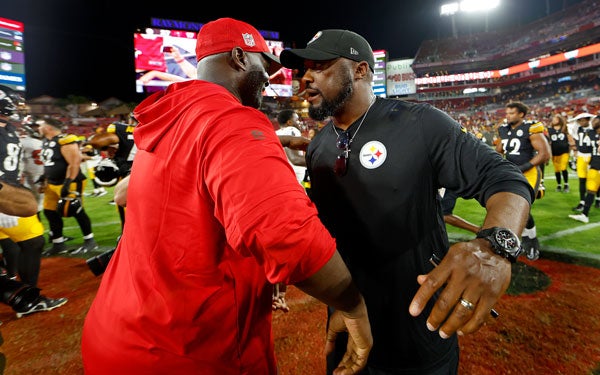Pittsburgh Steelers coach Mike Tomlin stormed out of Monday’s post-game news conference when a reporter began to ask about his soon-to-expire contract. Tomlin’s team had just lost to the Buffalo Bills, marking another early exit from the NFL playoffs.
The episode elicited plenty of commentary from pundits, including Sports Illustrated’s Michael Rosenberg, who urged readers to consider Tomlin’s skin color before criticizing his actions.
“Tomlin is the most successful black coach in the history of a sport with a deplorable record of hiring black coaches. That comes with a burden and a responsibility that he did not request and cannot escape,” Rosenberg wrote. “Successful white coaches get to assume any criticism is just about their coaching. That is a perk of their privilege. Tomlin does not have that option.”
The Daily Signal depends on the support of readers like you. Donate now
Rosenberg added: “If the most successful black coach in NFL history doesn’t get the respect he deserves, then how can black assistants get the opportunities they deserve?”
Suggesting that Tomlin was subject to a “racial double standard” and “racial bias,” Rosenberg acted like a typical corporate media elitist who views everything through the prism of race.
ESPN’s Brooke Pryor never got a chance to finish her question Monday because Tomlin left the room. Some pundits pointed to poor timing, but to suggest the question was disrespectful because of Tomlin’s skin color is just ridiculous.
Fortunately, another successful black coach—Todd Bowles of the Tampa Bay Buccaneers—took a different approach when race-obsessed reporters asked him about facing Tomlin before an October 2022 game.
“I have a very good relationship with Tomlin. We don’t look at what color we are when we coach against each other. We just know each other,” Bowles quipped. “I have a lot of very good white friends that coach in this league as well, and I don’t think it’s a big deal as far as us coaching against each other, I think it’s normal.”
He added, “We coach ball. We don’t look at color.”
Not content to move on, another reporter then questioned how Bowles couldn’t understand how “representation matters” to aspiring black coaches.
A clearly annoyed Bowles shot back: “When you say, ‘see you guys’ and ‘look like them’ and ‘grow up like them,’ means that we’re oddballs to begin with. And I think the minute you guys stop making a big deal about it, everybody else will as well.”
For decades, media outlets have anguished over the skin color of NFL coaches. Jerod Mayo, introduced as the new head coach of the New England Patriots, was asked about it twice at his news conference Tuesday.
In 2003, the NFL adopted the Rooney Rule, named after Dan Rooney, the late owner of the Steelers and former President Barack Obama’s ambassador to Ireland. The Rooney Rule is the league’s version of affirmative action, requiring teams to interview minority candidates for head coaching jobs and other positions.
Even as corporations start to shed toxic so-called diversity, equity, and inclusion policies and some colleges begin to abandon illegal race-based admissions, don’t expect the same of the NFL. It will take more than outspoken leaders like Bowles to bat down reporters’ race-baiting questions.

As for Tomlin, since that fateful press conference Monday, he’s promised to return to the Steelers for another year. As a lifelong Steelers fan, I’m glad he’ll be back. He’s never had a losing season. And yet I’m as frustrated with his playoff performance as other Steelers fans.
Over the course of his 17 seasons, Tomlin’s playoff record is 8-10. After winning the Super Bowl in his second season as coach, he has disappointed Steelers fans, particularly in recent years. The Steelers set an NFL record for allowing 202 points to be scored on them over their last five playoff games.
There are certainly other factors to blame for the Steelers’ recent Super Bowl drought. But that doesn’t make Tomlin immune from criticism. Running back Najee Harris, for example, pointed to a lack of discipline, which falls squarely on Tomlin’s shoulders.
“The standard is the standard,” Tomlin is known for saying.
In that spirit, let’s judge the man on his record, not his race.
Have an opinion about this article? To sound off, please email letters@DailySignal.com and we’ll consider publishing your edited remarks in our regular “We Hear You” feature. Remember to include the URL or headline of the article plus your name and town and/or state.





























